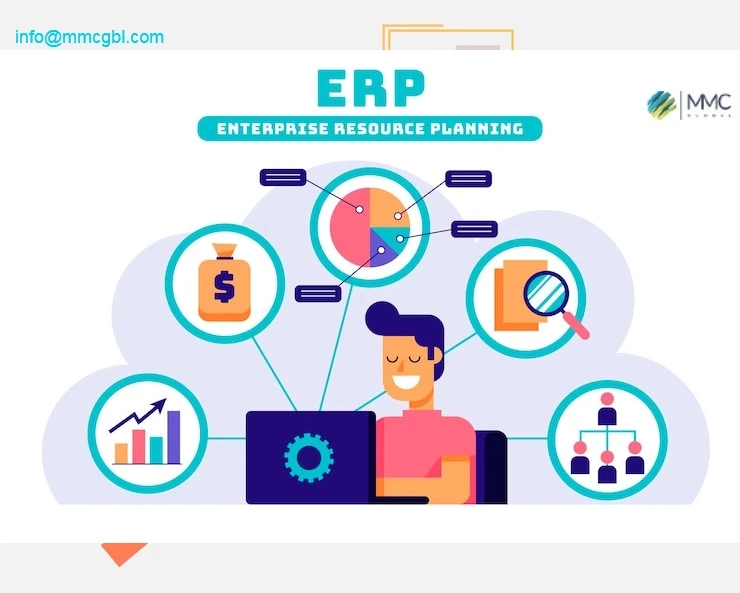When a business grows, the workload of administrators also grows on an exponential basis. Initially, companies used to make spreadsheets, to-do lists, and emails to manage their workload, which was not effective enough with the increase in business operations. Enterprise resource planning software emerged as a game-changer to meet these requirements and cope with customer demands.
ERP is a type of software that integrates and manages a company's finance, supply chain, sales, commerce, reporting, manufacturing, and other operations. Organizations can effectively and efficiently perform their functions and achieve their objectives using ERPs for day-to-day work.
Need of ERP Software
ERPs have become an essential need for every business, irrespective of entity size. Organizations have been spending lots of dollars to acquire ERP systems. But why do companies need to invest in Enterprise Resource Planning software? Continue reading to find out!
Better Accounting and Financial Reporting
Keeping track of financial and growth accounting records is essential in determining the growth of your business. But with the extension in the organization, keeping track of these complex day-to-day transactions becomes difficult. This is where ERPs act as a savior for companies.
Manual data entry of transactions having repetitive nature is quite hectic sometimes. ERP systems reduce this workload by providing an easy-to-use interface for recording daily accounting transactions. It increases the visibility of crucial operational data and makes it easy for the upper management to make decisions.
Regulatory Compliance and Security
This factor is significant for companies working in the manufacturing industry. Some ERP software ensures that the back-end working of the organization is in-lined with the regulatory rules and regulations of the industry.
Enterprise Resource Planning software does not only simplify your data processing and streamlines business operations. But they also improve your security by providing features like in-built firewall systems and regulated data access. It is also helpful for administrators when multiple processes are integrated into a unified system.
Standardization of Software
An ERP system provides a standard and integrated procedure to perform different tasks. When there is an unmanaged system in an organization, different people use different approaches to conduct business operations in an integrated way, leading to chaotic data transfer, security gaps, and time-consuming processes.
An ERP mitigates these problems by providing a centralized and integrated platform where personnel from different departments can share and access data and promote data security.
Faster Response Times
When your organization starts to get traction in the market and your brand’s reputation increases, the factor of quick response to the customers and other stakeholders of the company can give you a competitive edge in the industry. To make a better customer relationship, the sales team and front-line executives must be equipped with all the necessary information. It requires integration across all departments and data access within them.
Most companies use accounting software to perform these functions, which are not compatible enough to integrate different departments’ data into a centralized system. While most ERP software today provides accounting functionalities, making it easier for users to avoid repetitive work.
Mobility and Flexibility
As modern workplace concepts like BYOD are arising, flexibility in workplaces is becoming essential. This is the factor that organizations should consider when choosing software for the company.
ERP solutions today can perform various functions by leveraging a centralized database to provide exact information to the users on any device, anywhere in the world. Remote access to the database and critical numbers saves a lot of time and effort and ensures the delivery of quality work within deadlines.
Read More: What Are ERP Solutions? Why Should Businesses Invest In ERPs?
7 Best Free and Open Source ERP Systems
The leading players in the game of ERP are Oracle, SAP, and Microsoft Dynamics. The services they offer are comprehensive, but they are pretty expensive as well. Small businesses can not afford that. Therefore, we have compiled a list of free and open-source ERP systems that you can use to improve your work efficiency.
iDempiere
iDempiere is a comprehensive ERP software that offers everything from warehouse management to forecasting to invoicing to POS integration. While it is open-source software, installing an ERP is never really free. An estimated budget is around $20 thousand and $100 thousand for businesses having a revenue of $10 million to $100 million.
iDempiere, like most of the other ERP systems, relies on community support for problem solving. Businesses can also hire iDempiere experienced personnel for troubleshooting.
This software provides almost everything a business needs, whether warehouse management, product planning, payroll, or any other function. iDempiere is one of the most powerful open-source options available for ERP.
Odoo
This ERP system is free for two users if it is used online, but you have to pay if the number of online users is increased. However, if you choose to install and use the in-house software of Odoo, it is totally free.
If you want to develop an ERP system that does not have too many users, Odoo might be the perfect option. This software covers all standard channels of warehousing, manufacturing, and sales. The distinguishing feature of Odoo is that the whole ERP system revolves around a series of apps.
Using this ERP system, you can get access to apps that help you build a website, install eCommerce portals, and run a CRM by paying a monthly fee.
One of the limitations that Odoo possesses is the need to have a skilled technical team. Fortunately, adding more than two online users is not prohibitively expensive. Odoo provides a solution that can grow with your business with its scaled approach to users and features.
webERP
webERP is an online-based ERP software. Users can access it from any device that supports a browser and a PDF reader. This ERP software is installed on a web server and it can be either be owned and managed by the company itself or provided by a third party.
webERP is mainly designed for less-technical businesses, the code is easily readable and editable. That is why some experts say that this simple nature of webERP leads to limitations in functionality.
All in all, you can employ webERP quite quickly and cheaply but later on, you might need the expansion.
Openbravo
Openbravo is another completely web-based ERP solution provider. It offers three different packages depending upon the needs of the business. The Openbravo community version is the free release, a skimmed version of the paid enterprise and professional edition of Openbravo. It includes some premium and commercial modules such as inventory management and financial management, which are vital for most businesses.
If you choose to move up to the professional version with more premium features, it will cost you around $4,500 per annum, while the premium version costs $22,000 per year with an extensive range of benefits.
ERPNext
ERPNext is specially designed for small and medium-sized businesses, and it is presented as a series of apps. It is ideal to be used by people who have less technical knowledge which is a blessing and sometimes a curse.
The simplicity of this ERP system makes it easy to set up by making it easy to fill forms for business users during registration, and the whole process of setup is pretty simple and, in particular, setup wizard style. It is the feature that makes businesses quickly familiar and user-friendly with ERPNext.
The limitation of this system arises when you want to expand the business operations in your ERP system. Although there are built-in tools for designing some particular forms and reports, adding more complex objects first requires diving into the code.
Opentaps
In contrast to the other ERPs discussed above, Opentabs is designed for businesses with high volumes and complex operations. Having said that, this ERP contains a lot of flexibility and power.
In Opentaps, you get a set of modules necessary to run your business, such as inventory management, financial management, purchasing, and manufacturing. Another distinguishing feature that you get is analytics, you can analyze all aspects of your business using this ERP software. Later on, you can use this information to plan better for the future. Furthermore, Opentaps provides a robust module for reporting as well.
Cherry on the cake, you can purchase add-ons and additional features to even improve the Opentaps’ performance. Although they are very less in number, they include integration with FedEx and Amazon Marketplace Services.
Dolibarr
Dolibarr is on the list of those ERP systems that provide ERP services to small and medium-sized businesses. Using this software, you can have end-to-end management of your business, from keeping track of contracts, orders, invoices, inventory, and payments to managing the documents and supporting the POS system. All you can get is a relatively clean interface.
Dolibarr offers an add-ons store where you can purchase the extended version of the software. Moreover, you can get an online demo too.
Ending Notes
Enterprise Resource Planning (ERP) saves lots of time and effort for organizations and makes every day workload easy and quick. Hiring services of top ERP systems such as Oracle, SAP, and Microsoft Dynamics might not be affordable for small and medium-sized businesses. That’s why we have produced a list of the best ERP software that are open-source and free or require minimum costs.
Nobody can deny the importance of ERPs these days and the benefits it brings to the business. You can choose any of the above-discussed ERP systems for your organization, and you may also get your customized software designed according to your needs and requirements from the best ERP services provider in the region.
0


